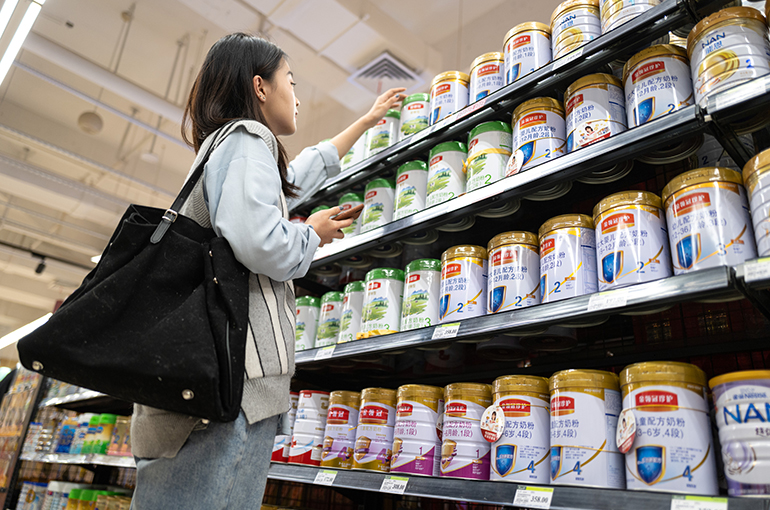 China’s Under Pressure Baby Formula Makers Aren’t Ready to Go Global
China’s Under Pressure Baby Formula Makers Aren’t Ready to Go Global(Yicai) Aug. 15 -- As China’s birthrate slows, the country may no longer be the world’s key market for infant formula and the pressure on producers will intensify. But many have no plans to make a play for market share overseas, they told Yicai.
Births in China may fall below 8 million this year, Li Shengli, chief scientist at the semi-official National Dairy Industry and Technology System, told the World Dairy Industry Conference earlier this month, citing predictions.
Since hitting an 18.83 million high in 2016, the number of newborn babies has dropped over the past few years, he added.
The Chinese market for infant formula is shrinking in parallel. After peaking at 900,000 tons between 2018 and 2019, it is expected to contract to about 600,000 tons to 700,000 tons in the next few years, Yan Weibin, chairman of Ausnutria Dairy, said at a corporate event last month.
African Market
Some Chinese producers, including Hong Kong-based H&H Group and Ausnutria Dairy, have ventured abroad through their existing overseas plants, though their international sales make up just a small fraction of the total.
Kabrita, Ausnutria’s affiliated goat milk formula maker, markets products in South Africa and even sold more than 200,000 cans last year, according to a senior executive at Ausnutria. It plans to invest more in Africa this year, the person added.
But most of China’s milk formula producers have not considered going global. The executive running a big state-owned maker told Yicai that not many are prepared to explore the African market, though the continent has a great number of newborns and the potential for rapid market growth.
One reason for their reluctance is the vast size of the Chinese market and their familiarity with it, the executive said, adding that the other reason is that most Chinese formula makers do not have overseas operating experience.
Milk Price
Another drawback is the cost of raw milk in China. It is quite high and would weigh on the competitiveness of China-made formula abroad along with the country’s higher overall costs for product research and development and quality control, said He Kanghui, general manager at Tantoo, who once ran an infant formula business in Australia.
Despite Africa’s higher birthrate, consumer purchasing power is limited there, so the market’s potential remains to be confirmed, noted Song Liang, an independent dairy industry analyst, adding that Southeast Asia, which is closer to China, will probably have better opportunities. But SE Asia is also a key market for the international dairy giants, so Chinese brands would come up against tough competition, Song added.
Other jurisdictions also have their own laws and regulations on formula for infants and toddlers as well as their own product specifications and marketing models, industry insiders pointed out. The marketing methods used in China may not work in other countries and regions, they said.
The Chinese brands that do foray overseas will also need to make efforts in respect of cultural identity and integration in the countries where they operate, and build competitive local sales teams, they added.
Editors: Tang Shihua, Peter Thomas